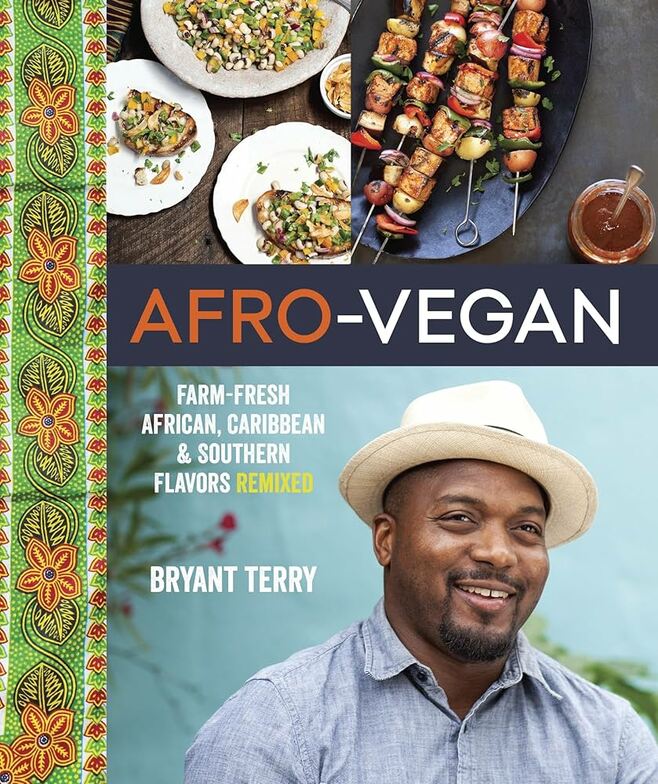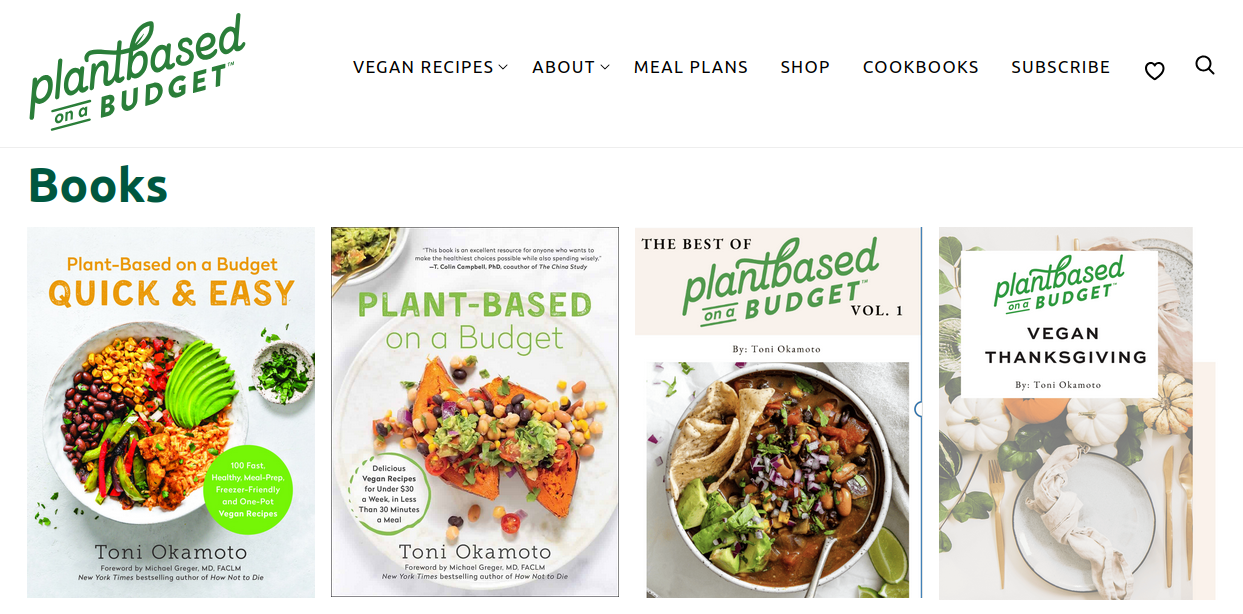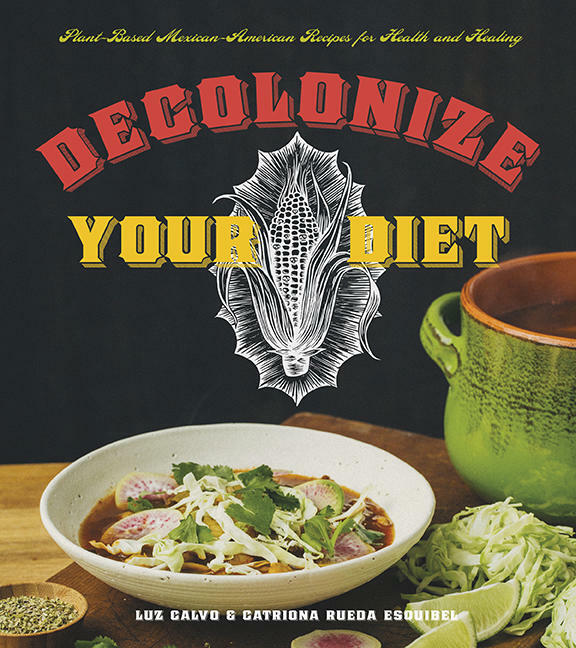Rationale: “Plant-based/vegan food is for the ‘elite’”
Versions of this bounce around popular culture — plant-based eating is for privileged (and mostly white) people, and plant-based food is more expensive. But this way of thinking misses three important facts.
Reconnecting with roots
BIPOC communities are among those seeing the fastest growth in plant-based eating in North America.[1] For many people, especially black, Indigenous, and people of colour, eating less or no meat is about reconnecting with roots and food sovereignty.[2] After all, so many cultures’ diets were historically much more plant-based than our industrialized diets are today.
Chicana authors Luz Calvo and Catriona Rueda Esquibel went plant-based after a cancer diagnosis, and wrote Decolonize Your Diet. This fascinating cookbook is inspired by centuries-old recipes from pre-colonial Mexico (published by Vancouver BC publisher Arsenal Pulp Press).
Taking back our health and environments
Some BIPOC thought leaders highlight political motivations for moving away from meat, as one way to disrupt corporate power and its factory farming that directly hurts their communities.[3] Health is another motivator, since communities of colour have been disproportionately affected by health problems that are linked to high consumption of meat and highly processed foods.[4]
 American chef Bryant Terry brought us Afro-Vegan (published by Ten Speed Press) and other books that celebrate Black culture and plant-based food.
American chef Bryant Terry brought us Afro-Vegan (published by Ten Speed Press) and other books that celebrate Black culture and plant-based food.
Getting more nutrients for our buck
Far from an expensive fad, eating plant-based is more economical than eating meat. One Oxford University study showed that, in wealthy countries, plant-based can be the lowest-cost way to eat.[5]
You can spend a lot of money on just about any diet you choose. Anyone — from meat-eater to vegan — can stress their budgets by choosing expensive ingredients and frequenting high-end restaurants. But neither of those is the same as healthy, simple, home-based eating. Plant-based eaters don't need to eat highly processed protein sources every day. We can choose inexpensive foods like rice, lentils, noodles, tofu, beans, and in-season vegetables.
So next time we hear this rationale for not talking about industrial meat, let’s put it to bed. Because plant-rich diets actually honour our diversity, our ancestors, and our budgets.
NOTES
[1] See “The Plant‑Based Revolution: How the BIPOC Community Plays an Important Role in Its Growth,” webinar, SupplySide Food & Beverage Journal, July 31, 2023, https://www.supplysidefbj.com/plant-based/the-plant-based-revolution-how-the-bipoc-community-plays-an-important-role-in-its-growth-webinar. Also see Laura Reiley, “The Fastest-Growing Vegan Demographic Is African Americans. Wu-Tang Clan and Other Hip-Hop Acts Paved the Way,” Washington Post, January 24, 2020, https://www.washingtonpost.com/business/2020/01/24/fastest-growing-vegan-demographic-is-african-americans-wu-tang-clan-other-hip-hop-acts-paved-way/.
[2] See Bryant Terry, Afro‑Vegan: Farm‑Fresh African, Caribbean, and Southern Flavors Remixed (Berkeley, CA: Ten Speed Press, April 8, 2014) and also founder of Black Vegans of Toronto: Guildford J. Thomas, Let Food Be Your Medicine Today: Live Healthy and Strong on Plant‑Based Whole Foods (Aurora, IL: Atiba Press, 2017).
[3] Julie Cappiello, “The Meat Industry Hurts BIPOC Communities. Here’s How,” World Animal Protection US, News and Blogs, February 11, 2021, https://www.worldanimalprotection.us/latest/blogs/meat-industry-hurts-bipoc-communities-heres-how/.
[4] See Alex Osiadacz, “Mayo Clinic Minute: How a Southern Diet Is Connected to Chronic Diseases,” Mayo Clinic News Network, April 21, 2022, https://newsnetwork.mayoclinic.org/discussion/mayo-clinic-minute-how-a-southern-diet-is-connected-to-chronic-diseases/ and Ioanna Yiannakou et al., “A Prospective Analysis of Red and Processed Meat Intake in Relation to Colorectal Cancer in the Black Women's Health Study,” The Journal of Nutrition 152, no. 5 (2022): 1254–62, https://doi.org/10.1093/jn/nxab419.
[5] Oxford University, “Sustainable Eating Is Cheaper and Healthier – Oxford Study,” News & Events, November 11, 2021, https://www.ox.ac.uk/news/2021-11-11-sustainable-eating-cheaper-and-healthier-oxford-study. The study is Marco Springmann et al., “The Global and Regional Costs of Healthy and Sustainable Dietary Patterns: A Modelling Study,” The Lancet Planetary Health 5, no. 11 (November 2021): e797–e807, https://doi.org/10.1016/S2542-5196(21)00251-5.
American Toni Okamoto is showing us all, through her Youtube channel, cookbooks, podcast, meal plans (many of them free), and more, that anyone can eat a tasty plant-based diet on a budget.


